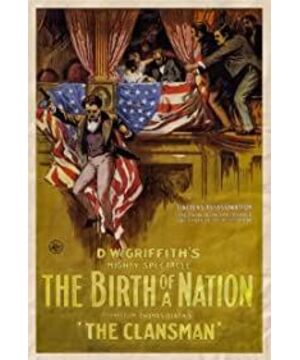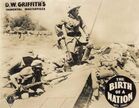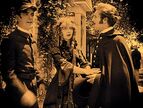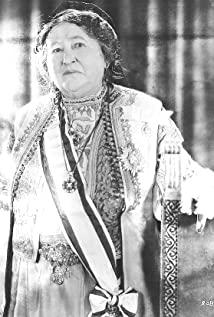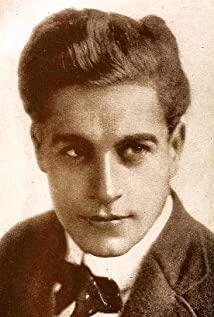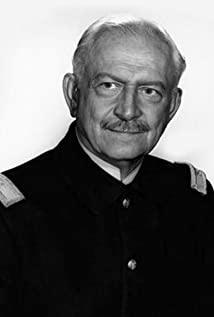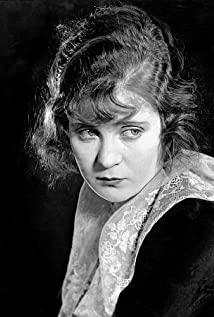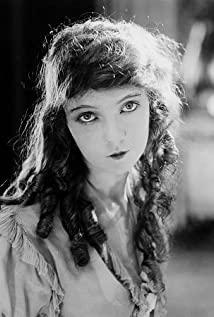"The Birth of a Nation" (English: The Birth of a Nation), also known as "The Clansman" (The Clansman), is one of the most influential and controversial films in the history of American cinema. It lasted three hours and became the world's first commercial film with a real meaning in history. Directed by David Walker Griffiths, the film is set during and after the Civil War and premiered on February 8, 1915. Due to the innovative shooting techniques, the advocacy of white supremacy, and the controversy caused by the beautification of the Ku Klux Klan, the film has an important position in the history of film. The script of "The Birth of a Nation" is adapted from Thomas Dixon's novel and stage play "Family People", which portrays the Ku Klux Klan as heroes.
The film was originally divided into two parts by an intermission. The first half of the story describes the United States before the Civil War, starting from the side-by-side comparison of two families: The Stoneman family in the north includes Congressman Austin Stoneman who advocated the abolition of slavery (the prototype is Congressman Tedier during the reconstruction period. Thomas Stevens (Thaddeus Stevens), his two sons and daughter Elsie, while the Camerons in the South have two daughters (Margaret and Fu Lola (Flora) and three sons (the most famous is Ben). The boys from Stoneman's family went to Cameron Manor in South Carolina to visit the Cameron family. It was the apex of the Old South and the most prosperous era represented by the Old South. Stoneman's eldest son fell in love with Margaret Cameron, and Ben Cameron was also fascinated by the portrait of Ash Stoneman. When the Civil War broke out, every boy from these two families joined his own army. A black militia led by white officers ransacked the Cameron Manor and attempted to rape every female family member of the Cameron family, but the Confederate army defeated these militias and saved them. At the same time, Stoneman’s youngest son and Cameron’s two boys were killed in battle; Ben Cameron was also wounded in a heroic battle that won him the “Little Colonel” (the Little Colonel). Colonel), which also became the name of him in the film in later episodes. The little colonel was sent to a Northern Army hospital, where he reunited with Ai Qian, who was a nurse. After the war, Abraham Lincoln at the Ford Theater (Ford' The assassination of s Theater) allowed Austin Stoneman and other radical congressmen to “punish” the secession of the South through reconstruction. The second half begins to describe the reconstruction period. Stoneman and his mulatto disciple Silas Lynch came to South Carolina to personally implement their plan to strengthen the power of southern blacks through election fraud. At the same time, Ban was inspired by white children pretending to scare away black children, and came up with a plan to try to reverse the apparent loss of southern whites. That was to organize the Ku Klux Klan, although the fact that he became a member of the Ku Klux Klan angered Ai Qian. . Then, a ferocious ex-slave who plots to possess a white woman, Gus brutally proposes to Flora. She fled into the forest, and Gus chased her; in the end, Flora, who had nowhere to escape on the edge of the cliff, jumped off the cliff to save herself from rape. The Ku Klux Klan’s response was to hunt Gus, lynch him, and put his body in front of Lieutenant Governor Silas Lynch. Lynch immediately retaliated and ordered the banning of the Ku Klux Klan. The Cameron family escaped the black militia and hid in a cabin where two former Union soldiers lived; according to the subtitles, the two agreed to help their former southern enemies defend them. "Aryan birthright" (Aryan birthright). At this time, after Austin Stoneman left, Lynch tried to force Ash to marry him. The disguised Ku Klux Klan discovered her situation and hurried to ask for help elsewhere. The Ku Klux Klan, which had reached its peak power at this time, rode back to rescue her, and seized the opportunity to expel all the blacks from their residence. At the same time, Lynch’s militia began to besiege Cameron’s hiding hut, but the Ku Klux Klan rescued them again in time. The triumphant Ku Klux Klan marched on the streets to celebrate, and the camera immediately jumped to the next general election. The Ku Klux Klan successfully deprived all blacks of their citizenship. The ending of the film is a double reunion. Phil Stoneman and Margaret Cameron, as well as Ben Cameron and Ash Stoneman, are married. The last scene shows that the people who have been oppressed by the mythical God of War suddenly find themselves regaining peace under the icon of Jesus Christ; the last line of subtitles even more gorgeously appeals: "Don’t we dare to dream of a cruel God of War no longer The golden age of rule was replaced by a benevolent king sitting in the Hall of Brotherly Love in the City of Peace (City of Peace)." Love) benevolent king. " Love) benevolent king. " The K Party members took to the streets to celebrate, and the camera immediately jumped to the next general election. The KKK successfully deprived all blacks of their citizenship rights. The ending of the film is a double reunion. Phil Stoneman and Margaret Cameron, as well as Ben Cameron and Ash Stoneman, are married. The last scene shows that the people who have been oppressed by the mythical God of War suddenly find themselves regaining peace under the icon of Jesus Christ; the last line of subtitles even more gorgeously appeals: "Don’t we dare to dream of a cruel God of War no longer The golden age of rule was replaced by a benevolent king sitting in the Hall of Brotherly Love in the City of Peace (City of Peace)." The K Party members took to the streets to celebrate, and the camera immediately jumped to the next general election. The KKK successfully deprived all blacks of their citizenship rights. The ending of the film is a double reunion. Phil Stoneman and Margaret Cameron, as well as Ben Cameron and Ash Stoneman, are married. The last scene shows that the people who have been oppressed by the mythical God of War suddenly find themselves regaining peace under the icon of Jesus Christ; the last line of subtitles even more gorgeously appeals: "Don’t we dare to dream of a cruel God of War no longer The golden age of rule was replaced by a benevolent king sitting in the Hall of Brotherly Love in the City of Peace (City of Peace)."
The whole film is based on two novels by Thomas Dixon, "The Family" and "The Spot of the Jaguar". The title of the film that premiered in Los Angeles’ Clune's Auditorium in February is still of the same family, but thanks to the suggestion of the author Thomas W. Dixon, it will be free in New York’s Times Square three weeks later (March 3) When the Liberty Theater officially held the East Coast premiere, the title was also changed. The title of the film was changed from "Family" to "The Birth of a Nation", reflecting Griffith's belief: Before the Civil War, the United States was just a loose association of states that were hostile to each other, and the North defeated the separation of the South. The states in the United States will eventually unite the federal states under the same national authority. However, even today, the Ku Klux Klan still claims to defend the “invisible empire” and “invisible nation” of “white women”. Therefore, some people interpret the title as “The Birth of the Invisible Nation” (The Birth of the Invisible Nation). ).
Political ideology "History of the American People" is quoted in "The Birth of a Nation"
This film is highly controversial due to its historical interpretation. Steven Mintz, a film historian at the University of Houston, summarized the message of this film as follows: Reconstruction is a catastrophe. Blacks can never be integrated into white society on an equal footing, and the violent acts of the Ku Klux Klan It was rationalized as an action to rebuild the integrity of the government. This film portrays the post-Civil War South as precarious because its enemies (abolitionists, mulattos, and Republican politicians from the north) manipulated blacks against whites in the South, and hinted that the Ku Klux Klan was the party to rebuild order. This was also the almost one-sided view of white American historians at the time. Among them, the Downing School was the most representative, but it was also strongly criticized by WEB Dubois and other black historians at the same time. The Downing School ignored these people at all. Some scholars insisted on this view even until the end of the Second World War, such as E. Merton Kurt (E. Merton Coulter's "The South Under Reconstruction" (1947); it was not until the Civil Rights Movement of the 1950s and 1960s that a new generation of historians (such as Eric Foner) rethink reconstruction Period, different views on that era. Many of the contents of the film seem to be appalling racism in the eyes of today’s audience: the black man in the film follows the white woman squintly, while the black congressman eats chicken and takes off his shoes during the proceedings. . Although several black actors are used in this film to play secondary roles, the vast majority of black or mixed-race roles are played by white actors in blackface costumes. This was a popular fashion in Hollywood at the time, because any role that had close contact with a white actress had to be played by a white male. (For example, the maid at Cameron’s house is not only white, but obviously male.) One of the card subtitles (intertitle) claims that the following scene is from a real photo of the state assembly; but this subtitle is actually Placed in an empty courtroom scene, and then faded out with the scene, began to stage a black grandstanding farce. This is considered to be Griffith's cover-up technique; he actually used empty court photos as the source of the scene, but misled the audience with subtitles. Response Although the film is highly profitable and has been favored by some white film critics and white fans, it has also suffered strong protests from blacks since its release. The film’s premieres in various places were widely protested by the newly established National Association for the Advancement of Colored People (NAACP). Griffith said that the harsh criticism surprised him. The political views expressed in "The Birth of a Nation" caused opposition to it as soon as it was released. Riots occurred in Boston, Philadelphia and other major cities, while Chicago, Ohio, Denver, Pittsburgh, St. Louis, Kansas City and Minneapolis banned the film from being released. According to legend, the film created an atmosphere that encouraged white gangs to attack blacks. In Lafayette, Indiana (Lafayette, Indiana), a white man killed a black teenager after watching this film. Thomas Dixon, the author of the original script "Family People", was a classmate of President Wilson. Dixon arranged a screening at the White House for the president, ministers and their families. According to reports, Wilson’s comment on the film is “It’s like a lightening of history. My only regret is that all this is so real.” Arthur Link in "Wilson: New Freedom" (Wilson: New Freedom) The New Freedom quoted the testimony of Wilson’s confidential secretary Joseph Tumulty, denying that Wilson had said these words, and declaring that “the President had no knowledge of the nature of the script before the screening, And never applauded it." This erroneous quotation that has appeared repeatedly in newspapers and magazines is obviously from Dixon himself. In order to promote the film, he rarely resorts to any means, and even promotes it under the name of "Federal Government Approval". However, after the controversy caused by the film expanded, Wilson expressed his disapproval of this "unfortunate product" in private correspondence. Several independent black producers have published Emmett J. Scott (Emmett J. Scott). Scott) directed "The Birth of a Race" (1919) in response to "The Birth of a Nation." This film depicting the positive image of black people was severely criticized by white film critics, but black film critics and fans who went to the apartheid theater to watch it were full of praise. Oscar Michaeux, who is also a director, producer and writer, also responded to "The Birth of a Nation" with "Within Our Gates" (1919), with a lecherous The plot of whites assaulting black women reverses a key scene in the Griffith film. "The Birth of a Country" is also inseparable from the resurrection of the Ku Klux Klan. After a long period of disappearance, it regained momentum in the same year the film was released; it also affected the transformation of public opinion in the North towards the South. Even after half a century has passed, pro-Confederate idealism still circulates in the south and hinders the unification of national ideology. Until the 1970s, the Ku Klux Klan still used this film as a tool for recruiting new soldiers. Even after nearly a century after its release, the film is still full of controversy. On February 22, 2000, "Los Angeles Times" editor Claudia Kolker (Claudia Kolker) wrote in an article titled "Historicists face up to the painful presentation of the country's bloody past": World War I The end not only brought about an economic crisis, but also triggered an upsurge of communism that affected minorities and trade union groups. Just three years ago, the long-dead KKK resurrected with the help of the movie "The Birth of a Nation".
View more about The Birth of a Nation reviews


